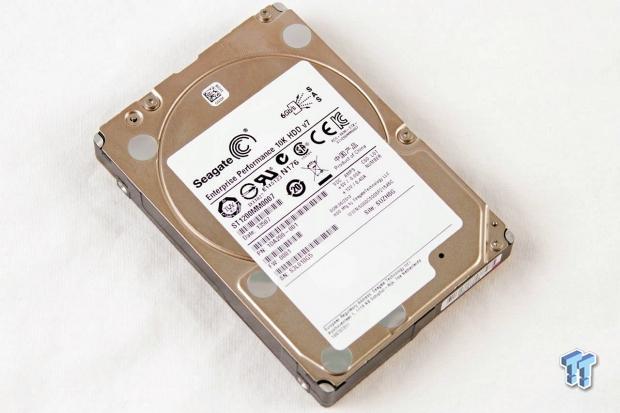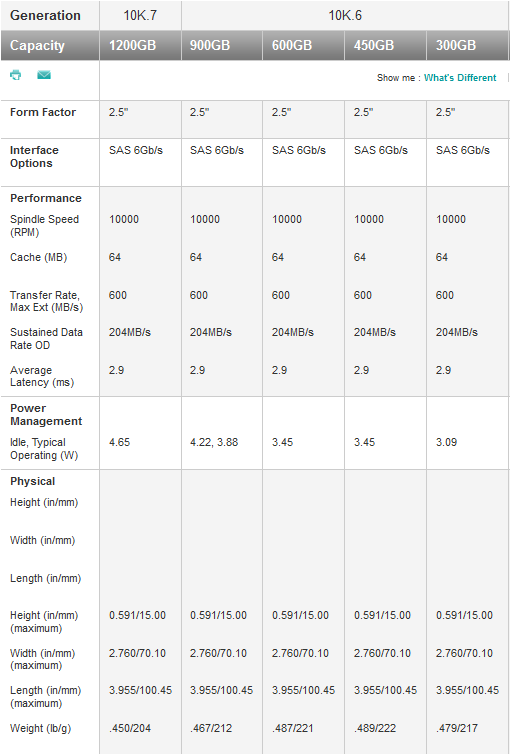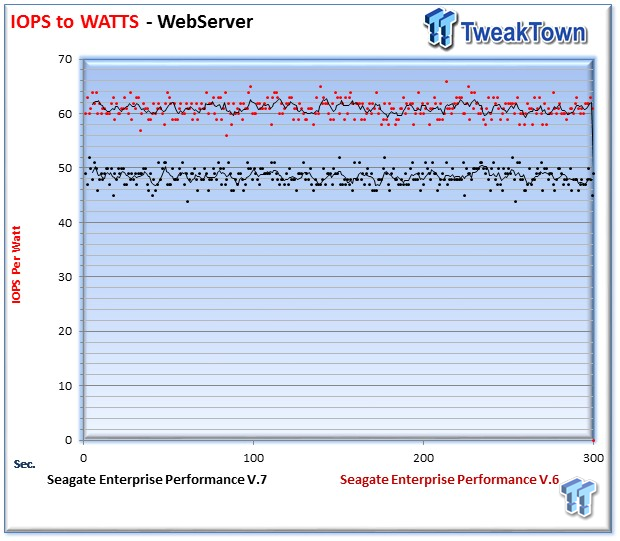Introduction

The Seagate Enterprise Performance 10K v7 provides a new enterprise-class SAS 6Gb/s 10,000 RPM HDD in a slim 2.5" form factor. These seventh-generation HDDs from Seagate are geared for those with the need for a fast layer of mission-critical storage. The 10K v7 is only offered in a capacity of 1.2TB, an increase of 300GB over the previous Enterprise Performance 10K v6.
Many would be surprised to know of a challenge to current generation high-performance 2.5" HDDs in the advent of newer SSDs with larger capacities. Withstanding the onslaught of SSDs has been easy for the 2.5" 10K HDDs, as the price per GB of SSDs continues to relegate them to niche applications in the majority of datacenter applications. While the continued price advantage of HDDs keeps the SSD's at bay, any advantage in capacity can begin to tip the scales in favor of SSDs.
Enter the Seagate Enterprise Performance 10K v7. Spinning 1.2TB of storage on four glass substrate platters at 10,000 RPMs delivers performance that can handle OLTP, database, and other mission critical data in write intensive environments. The 10K v7 features the same areal density as its predecessor, the 10K v6, but adds an extra platter and two more heads (a total of eight) to deliver the bump in capacity.
Seagate has taken the approach of utilizing the 10K v7 to compliment the 10K v6 series instead of supplanting it and its smaller capacities of 900, 600, 450, and 300GB. This creates a hierarchal approach with the 10K v7 setting atop the product stack as the high capacity 10K RPM enterprise HDD offering. The 10K v6 is really an evolution of the v6 in many ways, with very few differentiating factors outside of the capacity increase and slightly higher power consumption metrics.
The sustained data rate holds steady at 204 MB/s (125-204 MB/s from inner to outer tracks) and the average latency stays at 2.9ms. Both versions feature 64MB of programmable and segmented cache. The 10K v7 allows for different modes of operation for the cache, and users have the option of enabling a prefetch feature for read-ahead caching.
The addition of the extra platter and heads affects the power consumption of the HDD, with the typical operating wattage jumping to 4.65 Watts from the 10K v6's average of 4.22 Watts. Both drives feature the SAS interface for High Availability features and robust SCSI command set functionality. Reliability remains unchanged at 2.0 million hours MTBF and an AFR of 0.44%. The 10K v7 also offers encryption standard on all models, and the optional FIPS 140-2 certified SED models.
Other notable features the 10K v7 shares with the v6 are Seagate's RAID Rebuild functionality and T-10 compliant PowerChoice technology to optimize idle power consumption. Seagate's Instant Secure Erase feature also allows for easy cleansing of the drive prior to repurposing or retirement. In dense server applications, such as high capacity racks, the addition of an extra 300GB of capacity per bay adds up quickly. This enhanced capacity allows for larger high-performance tiers in space-constrained environments.
Today we are going to place the Seagate Enterprise Performance 10K v7 against its predecessor, the Enterprise Performance 10K v6, to observe any generational differences between the two products.
Enterprise Performance 10K v7 Specifications

The Seagate Enterprise Performance 10K v7 comes in a standard 2.5" form factor with a 15mm z-height. The 10K v7 is available in only one capacity, 1.2TB, with the 10K v6 series offering smaller capacity 10K HDD options. The 10K v7 features four glass substrate platters with eight heads and an areal density of 538bit/sq.
The 10K v7 delivers sustained speeds of 204 MB/s, an average latency of 2.9ms, and 64MB of programmable multi-segmented cache. Logical block sizes are user-configurable at 512, 520, 524, or 528 bytes per logical block.
The RAID Rebuild feature enables faster recovery from a failed drive in a RAID configuration. RAID Rebuild improves performance by extracting easily readable data from a failing drive by identifying blocks that would take longer to recover from the failed drive than to rebuild from parity data in the RAID array. This minimizes the likelihood of a second drive failure in the array during rebuild and allows host control of error recovery.
Seagate's Instant Secure Erase reduces the time required to overwrite the drive from hours to less than a minute, speeding the process of repurposing or retirement of the drive. Protection Information (PI) technology provides an end-to-end data protection scheme that prevents data corruption from the application level down to the drive.
T10-compliant Seagate PowerChoice technology enables users to tailor systems for optimal performance and power usage. The average operating power for the 1.2TB model we are testing today weighs in at 4.65W. The v7 sports an AFR (Annualized Failure Rate) of 0.44%, an MTBF of 2.0 million hours, and a five year warranty.
Enterprise Performance 10K v7 Internals


The Seagate Enterprise Performance 10K v7 comes in a standard 2.5" SFF with a 15mm z-height. The components face into the body of the drive to facilitate heat transfer into the case, which acts as a large heatsink.


Removing the PCB reveals the drive controller and drive motor controller components with a thermal pad covering. We can observe the two metal squares on the bottom of the HDD case that transfer the heat from the thermal pads into the case of the HDD.

The Samsung chip is a 64MB DDR2 component for caching, a Smooth chip to control the drive motor, and a Marvell drive controller.

The SAS 6Gb/s connection allows for a robust instruction set, dual port and failover technologies.
Test System and Methodology


We utilize a new approach to HDD and SSD storage testing for our Enterprise Test Bench, designed specifically to target long-term performance with a high level of granularity.
Many testing methods record peak and average measurements during the test period. These average values give a basic understanding of performance, but fall short in providing the clearest view possible of I/O QoS (Quality of Service).
'Average' results do little to indicate the performance variability experienced during actual deployment. The degree of variability is especially pertinent, as many applications can hang or lag as they wait for I/O requests to complete. This testing methodology illustrates performance variability, and includes average measurements, during the measurement window.
While under load, all storage solutions deliver variable levels of performance. While this fluctuation is normal, the degree of variability is what separates enterprise storage solutions from typical client-side hardware. Providing ongoing measurements from our workloads with one-second reporting intervals illustrates product differentiation in relation to I/O QOS. Scatter charts give readers a basic understanding of I/O latency distribution without directly observing numerous graphs.
Consistent latency is the goal of every storage solution, and measurements such as Maximum Latency only illuminate the single longest I/O received during testing. This can be misleading, as a single 'outlying I/O' can skew the view of an otherwise superb solution. Standard Deviation measurements consider latency distribution, but do not always effectively illustrate I/O distribution with enough granularity to provide a clear picture of system performance. We use histograms to illuminate the latency of every single I/O issued during our test runs.
We measure power consumption during test runs. This provides measurements in time-based fashion, with results every second, to illuminate the behavior of power consumption in steady state conditions. Power consumption can cost more over the life of the device than the initial acquisition price of the hardware itself. This significantly affects the TCO of the storage solution. We also present IOPS-to-Watts measurements to highlight the efficiency of the storage solution.
The Seagate Performance 10K v6 used as a comparison drive is a 900GB HDD. This must be taken into consideration when viewing results of the 1.2 TB 10K v7. We conduct our tests over the full LBA range to allow each HDD to highlight its top performance. The first page of results will provide the 'key' to understanding and interpreting our new test methodology.
4K Random Read/Write

Each QD for every parameter tested includes 300 data points (five minutes of one second reports) to illustrate the degree of performance variability. The line for each QD represents the average speed reported during the five-minute interval.
4K random speed measurements are an important metric when comparing drive performance, as the hardest type of file access for any storage solution to master is small-file random. One of the most sought-after performance specifications, 4K random performance is a heavily marketed figure.
The Seagate Enterprise Performance 10K v7 scores very closely to the 10K v6 with an average speed of 410 IOPS at QD256, a minimal loss to the 10K v6, which averaged 414 IOPS.

The 10K v7 averages 365 IOPS at QD256 in our 4K write testing, again within range of the 10K v6 with its average of 368 IOPS.

Our write percentage testing illustrates the varying performance of each solution with mixed workloads. The 100% column to the right is a pure write workload of the 4K file size, and 0% represents a pure 4K read workload.
The Seagate Enterprise Performance 10K v7 scores nearly perfectly in line with its predecessor, and exhibits similar performance consistency.

The Seagate Enterprise Capacity 10K v7 trades blows with the 10K v6, with a slight tendency towards a higher latency range.

We record the power consumption measurements during our test run at QD256.
The Seagate 10K v7 averages 6.88 Watts, an incremental increase of .72 Watts over the 10K v6.


IOPS to Watts measurements are generated from data recorded during our test. The Seagate 10K v7 delivers an average of 52.5 IOPS per Watt for 4K random writes, and 47.6 IOPS per Watt for 4K random read access.
8K Random Read/Write

8K random read and write speed is a metric that is not tested for consumer use, but for enterprise environments this is an important aspect of performance. With several different workloads relying heavily upon 8K performance, we include this as a standard with each evaluation. Many of our Server Emulations below will also test 8K performance with various mixed read/write workloads.
The Seagate Enterprise Performance 10K v7 delivers an average of 404 IOPS at QD256, again exhibiting excellent random read speed in keeping with the previous generation of 10K Seagate offerings.

The average 8K random write speed of the Seagate 10K v7 is 361 IOPS at QD256, while the v6 delivered an average of 363 IOPS.

The Seagate 10K v7 again exhibits excellent performance characteristics in our mixed workload testing.

The Seagate 10K v7 falls into a slightly higher range with the majority of requests served in the 80-100ms range.

Power consumption for the Seagate 10K v7 averages 8.17 Watts during the test period, a difference of 1.61 Watts.


The Seagate 10K v7 delivers solid performance with an average of 43.7 IOPS per Watt in 8K random write, and an identical 43.7 IOPS per Watt for 8K random read access.
128K Sequential Read/Write

The 128K sequential speeds reflect the maximum sequential throughput of the HDD using a realistic file size encountered in an enterprise scenario.
The Seagate Enterprise Performance 10K v7 averages 195 MB/s at sequential read, beating the 10K v6 by 5 MB/s.

The Seagate V.6 averages an impressive 195 MB/s in sequential write speed; again beating the previous generation 10K v6 by 5 MB/s.

The Seagate V10K v7 outperforms the 10K v6 in sequential speed in our mixed read/write workloads.

The Seagate Enterprise Performance 10K v7 beats the 10K v6 with a lower latency range.

The 10K v7 averages 7.16 Watts during sequential write testing.


The Seagate 10K v7 provides 26.8 MB/s per Watt for 128K sequential write and 26.78 MB/s per Watt for sequential read.
Database/OLTP and Webserver
Database/OLTP

This test emulates Database and On-Line Transaction Processing (OLTP) workloads. OLTP is in essence the processing of transactions such as credit cards and high frequency trading in the financial sector. Enterprise HDDs are uniquely well suited for the financial sector with their low latency and high random workload performance. Databases are the bread and butter of many enterprise deployments. These are demanding 8K random workloads with a 66% read and 33% write distribution that can bring even the highest performing solutions down to earth.
The Seagate Enterprise Performance 10K v7 averages 395 IOPS at QD256, a difference of 7 IOPS in comparison to the 10K v6.


The Seagate 10K v7 averages 9.58 Watts during the test period.

The 10K v7 averages 40.87 IOPS per Watt in our Database/OLTP testing.
Webserver

The Webserver profile is a read-only test with a wide range of file sizes. Web servers are responsible for generating content for users to view over the internet, much like the very page you are reading. The speed of the underlying storage system has a massive impact on the speed and responsiveness of the server that is hosting the website, and thus the end-user experience.
The Seagate Enterprise Performance 10K v7 averages 399 IOPS at QD256, trailing by a scant five IOPS to the 10K v6.


The 10K v7 averages 8.15 Watts during the test.

The Seagate 10K v7 averages 48.44 IOPS per Watt during the measurement window.
Fileserver and Emailserver
Fileserver

The File Server profile represents typical file server workloads. This profile tests a wide variety of different file sizes simultaneously, with an 80% read and 20% write distribution.
The Seagate Enterprise Performance 10K v7 averages 527 IOPS at QD256, beating its predecessor soundly by a huge margin.


The 10K v7 averages 8.2 Watts.

The 10K v7 averages 64 IOPS per Watt during the measurement window, actually beating the 10K v6 in this test.
Emailserver

The Emailserver profile is a very demanding 8K test with a 50% read and 50% write distribution. This application is indicative of the performance of the solution in heavy write workloads.
The Seagate 10K v7 averages 383 IOPS at QD256.


The Seagate 10K v7 averages 7.69 Watts during the test.

The 10K v7 averages 49.3 IOPS per Watt.
Final Thoughts

Addressing performance challenges in dense environments with strict power constraints is essential in today's datacenter. The addition of an extra 300GB of capacity extends Seagate's portfolio of high performance 10,000 RPM HDD's, and also helps to fend off the SSD challengers, as they continue to gain capacity in the 2.5" form factor.
An additional platter helps increase density and delivers more storage, while the T-10 compliant Power Choice technology allows users to tailor systems for optimal performance and power usage. In power testing, the Seagate Enterprise Performance 10K v7 exhibited higher power consumption in comparison to the previous generation 10K v6.
This level of power consumption is a necessary trade-off to achieve the higher density in such a small form factor. In comparison to 3.5" 10K HDDs, the 10K v7 still holds an advantage that will benefit users moving to the smaller and more efficient 2.5" drives.
In performance testing, the Seagate Enterprise Performance performed within range of the 10K v6. The 10K v7 trailed by an average of five IOPS in our server emulations. In our random mixed workload testing, the Enterprise Performance 10K v7 held its own against the 10K v6, matching its performance across the board. In Fileserver testing, the Enterprise Performance 10K v7 pulled ahead by a large margin and outperformed the 10K v6 in IOPS to Watts as well. In sequential read/write workloads, the extra platter and heads rose to the challenge, and the current generation 10K v7 pulled ahead of the 10K v6 and delivered better latency and performance.
The Seagate Enterprise Performance is available with both standard encryption and FIPS 140-2 certified encryption. Encryption, and the extra FIPS layer, provides users with a means of securing their data. The Seagate Instant Secure Erase functionality rounds out the data security features.
Seagate is utilizing the Enterprise Performance 10K v7 as a standalone 1.2TB solution that serves as essentially a higher capacity extension of the previous generation 10K v6. In our testing, we experienced consistent performance, that only varied by slight percentage points with the previous generation of products.
The increased power consumption affected the IOPS to Watts ratio of the 10K v7, and overall the smaller capacity 10K v6 series are a more economical solution. In comparison to competing 3.5" 10K HDDs, the Enterprise Performance 10K v7 is still a far more efficient solution, so the higher power consumption metrics must be taken with a grain of salt.
Packing 1.2TB of capacity into a small form factor with solid performance and reliability was the goal, and the 10K v7 delivers. The Seagate Enterprise Performance 10K v7 performed within expectations, and with a 2.0 million hour MTBF and a five year warranty, customers can expect reliable performance over the long term.


 United
States: Find other tech and computer products like this
over at
United
States: Find other tech and computer products like this
over at  United
Kingdom: Find other tech and computer products like this
over at
United
Kingdom: Find other tech and computer products like this
over at  Australia:
Find other tech and computer products like this over at
Australia:
Find other tech and computer products like this over at  Canada:
Find other tech and computer products like this over at
Canada:
Find other tech and computer products like this over at  Deutschland:
Finde andere Technik- und Computerprodukte wie dieses auf
Deutschland:
Finde andere Technik- und Computerprodukte wie dieses auf